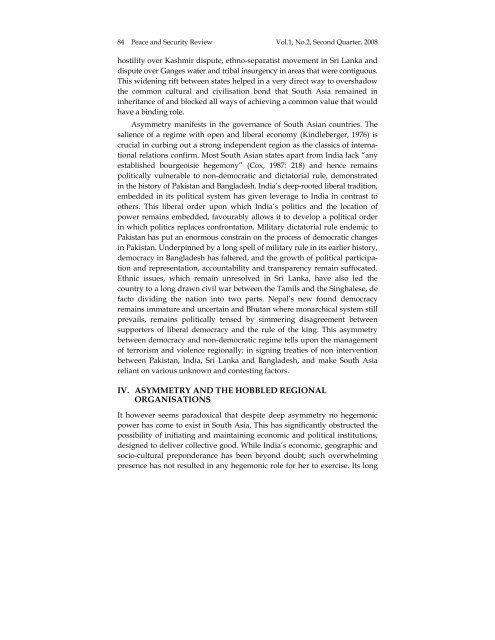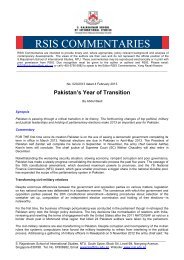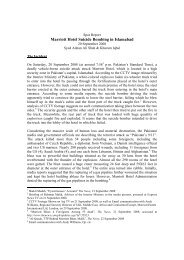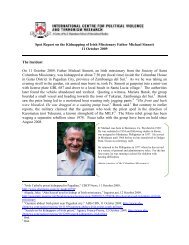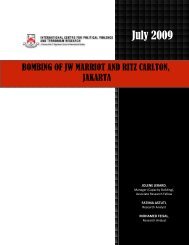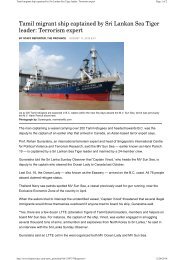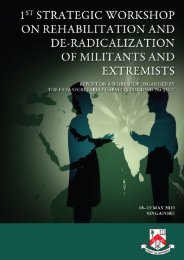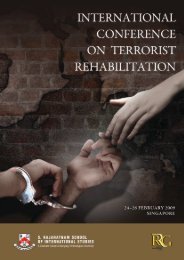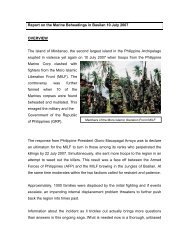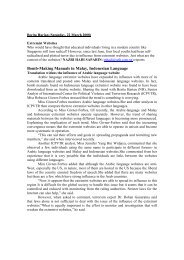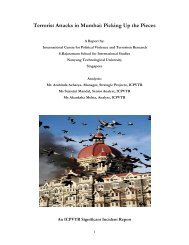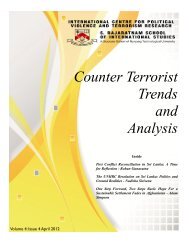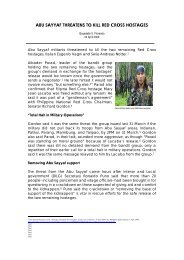Peace and Security Review, Vol.1 No. 2 - International Centre for ...
Peace and Security Review, Vol.1 No. 2 - International Centre for ...
Peace and Security Review, Vol.1 No. 2 - International Centre for ...
You also want an ePaper? Increase the reach of your titles
YUMPU automatically turns print PDFs into web optimized ePapers that Google loves.
84 <strong>Peace</strong> <strong>and</strong> <strong>Security</strong> <strong>Review</strong> <strong>Vol.1</strong>, <strong>No</strong>.2, Second Quarter, 2008<br />
hostility over Kashmir dispute, ethno-separatist movement in Sri Lanka <strong>and</strong><br />
dispute over Ganges water <strong>and</strong> tribal insurgency in areas that were contiguous.<br />
This widening rift between states helped in a very direct way to overshadow<br />
the common cultural <strong>and</strong> civilisation bond that South Asia remained in<br />
inheritance of <strong>and</strong> blocked all ways of achieving a common value that would<br />
have a binding role.<br />
Asymmetry manifests in the governance of South Asian countries. The<br />
salience of a regime with open <strong>and</strong> liberal economy (Kindleberger, 1976) is<br />
crucial in curbing out a strong independent region as the classics of international<br />
relations confirm. Most South Asian states apart from India lack “any<br />
established bourgeoisie hegemony” (Cox, 1987: 218) <strong>and</strong> hence remains<br />
politically vulnerable to non-democratic <strong>and</strong> dictatorial rule, demonstrated<br />
in the history of Pakistan <strong>and</strong> Bangladesh. India’s deep-rooted liberal tradition,<br />
embedded in its political system has given leverage to India in contrast to<br />
others. This liberal order upon which India’s politics <strong>and</strong> the location of<br />
power remains embedded, favourably allows it to develop a political order<br />
in which politics replaces confrontation. Military dictatorial rule endemic to<br />
Pakistan has put an enormous constrain on the process of democratic changes<br />
in Pakistan. Underpinned by a long spell of military rule in its earlier history,<br />
democracy in Bangladesh has faltered, <strong>and</strong> the growth of political participation<br />
<strong>and</strong> representation, accountability <strong>and</strong> transparency remain suffocated.<br />
Ethnic issues, which remain unresolved in Sri Lanka, have also led the<br />
country to a long drawn civil war between the Tamils <strong>and</strong> the Singhalese, de<br />
facto dividing the nation into two parts. Nepal’s new found democracy<br />
remains immature <strong>and</strong> uncertain <strong>and</strong> Bhutan where monarchical system still<br />
prevails, remains politically tensed by simmering disagreement between<br />
supporters of liberal democracy <strong>and</strong> the rule of the king. This asymmetry<br />
between democracy <strong>and</strong> non-democratic regime tells upon the management<br />
of terrorism <strong>and</strong> violence regionally; in signing treaties of non intervention<br />
between Pakistan, India, Sri Lanka <strong>and</strong> Bangladesh, <strong>and</strong> make South Asia<br />
reliant on various unknown <strong>and</strong> contesting factors.<br />
IV. ASYMMETRY AND THE HOBBLED REGIONAL<br />
ORGANISATIONS<br />
It however seems paradoxical that despite deep asymmetry no hegemonic<br />
power has come to exist in South Asia. This has significantly obstructed the<br />
possibility of initiating <strong>and</strong> maintaining economic <strong>and</strong> political institutions,<br />
designed to deliver collective good. While India’s economic, geographic <strong>and</strong><br />
socio-cultural preponderance has been beyond doubt; such overwhelming<br />
presence has not resulted in any hegemonic role <strong>for</strong> her to exercise. Its long<br />
<strong>Vol.1</strong>, <strong>No</strong>.2 2008 pp.77-93


